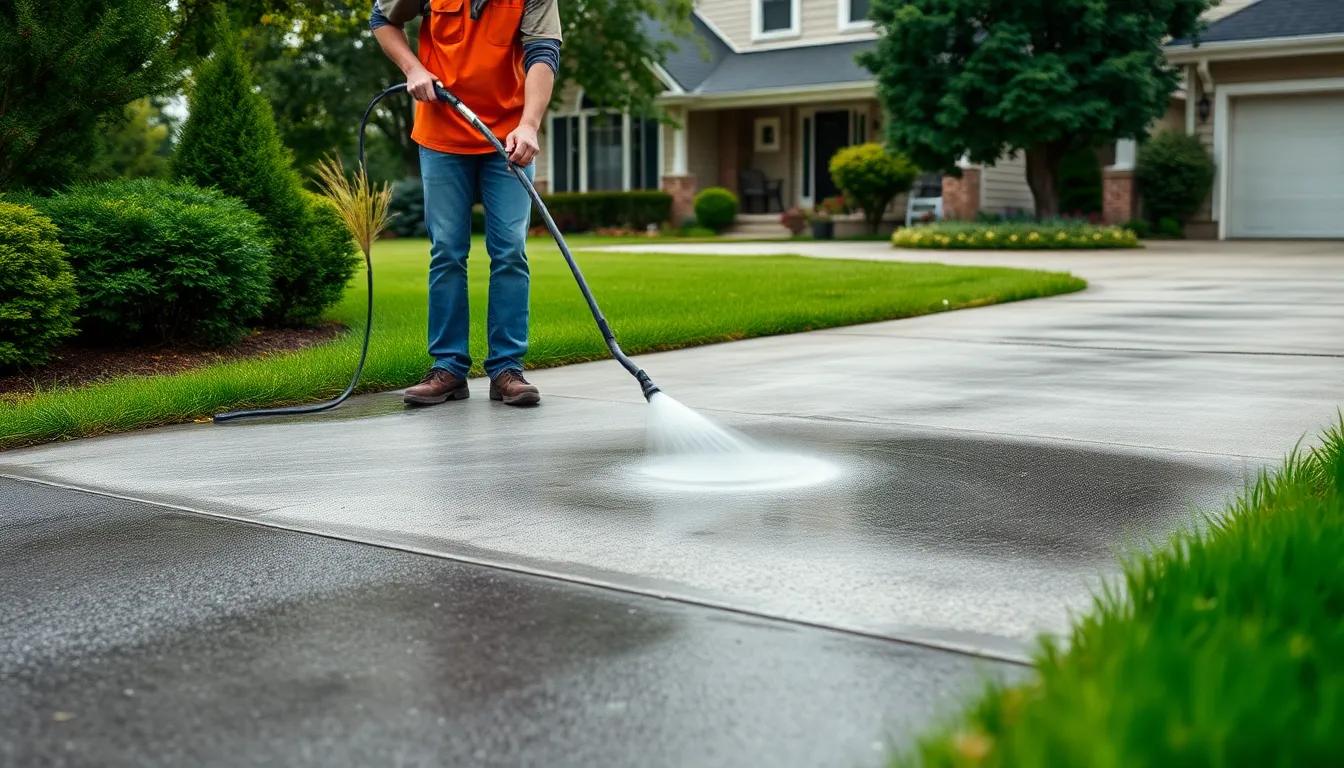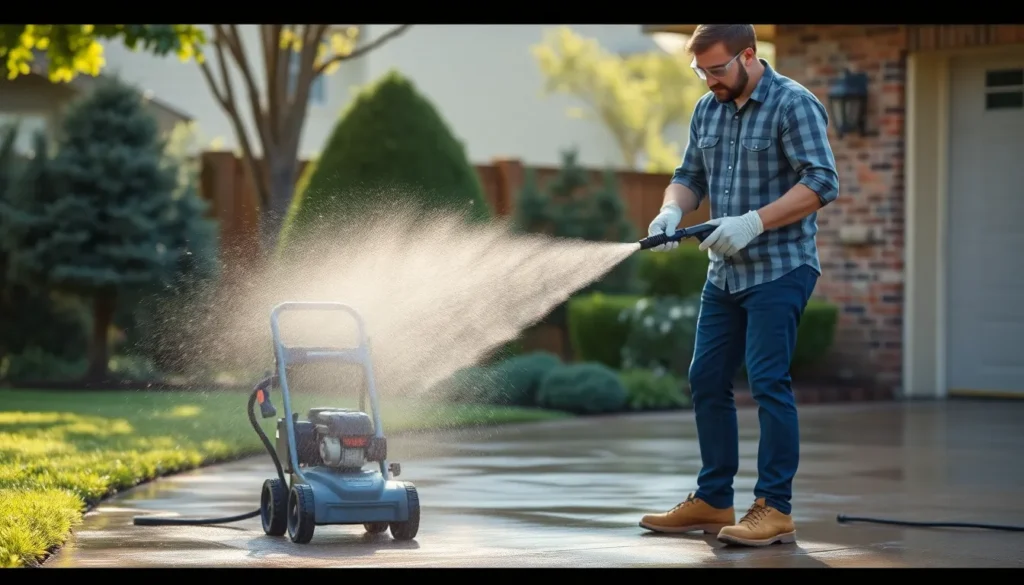Table of Contents
ToggleWhen dirt and grime decide to throw a party on your driveway, it’s time to call in the big guns—pressure washing. This powerful cleaning method blasts away years of stubborn stains, leaving surfaces looking brand new. Think of it as a spa day for your home, where every nook and cranny gets pampered and rejuvenated.
Overview of Pressure Washing
Pressure washing serves as a powerful cleaning method for a variety of surfaces. This technique utilizes high-pressure water spray to eliminate dirt, grime, mold, and stains effectively. Homeowners often seek this service to enhance curb appeal and maintain property value.
It’s commonly used on surfaces such as driveways, patios, decks, and siding. The benefits extend beyond appearance; pressure washing also helps prevent deterioration caused by buildup over time. Removing dirt and contaminants not only revitalizes these surfaces but also increases their longevity.
Industry experts recommend pressure washing at least once a year for optimal results. Seasonal changes and exposure to elements can lead to accumulation of debris, making regular cleaning essential. When surfaces are properly maintained, they remain in better condition, reducing the need for costly repairs.
During the pressure washing process, a professional typically assesses the surface material before starting. Different materials require varying pressure levels to prevent damage. For instance, wood surfaces need lower pressure compared to concrete due to their sensitivity.
Safety remains a priority throughout the pressure washing process. Using appropriate protective gear ensures safety for the operator and prevents damage to surrounding areas. Proper equipment and training contribute to effective cleaning without compromising safety.
Selecting a qualified service provider guarantees expertise, ensuring the job meets industry standards. Homeowners benefit from understanding the importance of regular pressure washing, as it significantly contributes to maintaining both aesthetics and structural integrity of their properties.
Benefits of Pressure Washing

Pressure washing offers multiple advantages that enhance property appearance and maintain its integrity.
Enhanced Curb Appeal
Increased curb appeal draws attention to a property. Freshly cleaned surfaces significantly improve the overall look of driveways, patios, and sidewalks. Dirt, algae, and stains disappear, revealing the original colors and textures. Homes with well-maintained exteriors stand out in neighborhoods. Real estate studies show that clean homes attract higher offers, demonstrating how buyers prefer appealing aesthetics. Regular pressure washing prevents grime buildup, sustaining a welcoming environment long term.
Health and Safety Advantages
Improved health and safety result from regular pressure washing. Mold, mildew, and allergens thrive on dirty surfaces, posing risks to residents. Removing these contaminants protects families from respiratory issues and allergies. Slippery surfaces can lead to accidents, particularly in high-traffic areas. Pressure washing minimizes this risk by eliminating buildup responsible for slips and falls. Investing in pressure washing not only enhances aesthetics but also secures a healthier living environment.
Common Uses of Pressure Washing
Pressure washing serves various purposes in both residential and commercial settings, proving its versatility as a cleaning method.
Residential Applications
Homeowners utilize pressure washing for numerous tasks. Driveways and sidewalks benefit from deep cleaning, eliminating oil stains and grime. Patios and decks regain their charm through effective removal of mold and dirt. Cleaning siding with pressure washing enhances the overall appeal of homes. Fences also receive attention, becoming free from mildew and discoloration. Regular maintenance helps preserve property value, ensuring longevity.
Commercial Applications
Businesses leverage pressure washing to maintain professional appearances. Storefronts often undergo cleaning to attract customers, ensuring a welcoming atmosphere. Parking lots experience regular washing to eliminate debris and enhance safety. Industrial facilities utilize pressure washing to maintain equipment, vital for optimal functionality. Restaurants depend on this technique to uphold hygiene and comply with health standards. Commercial properties frequently schedule pressure washing to safeguard their investments and improve aesthetic value.
Choosing the Right Pressure Washer
Selecting the right pressure washer involves understanding various models and their specific applications. Knowing the types and features can lead to an informed decision.
Types of Pressure Washers
Electric pressure washers provide convenience and are ideal for light to moderate cleaning tasks. Gas pressure washers offer greater power, making them suitable for heavy-duty jobs. Battery-powered models offer portability for small projects without the hassle of cords. Commercial pressure washers cater to businesses requiring performance and durability for frequent usage. Users must consider their cleaning needs to choose the most appropriate type.
Important Features to Consider
Power ratings, measured in PSI (pounds per square inch), indicate the pressure washer’s cleaning efficiency. Users should also evaluate GPM (gallons per minute), which signifies water flow for quicker cleaning. Additionally, consider adjustable nozzles for versatility across different surfaces. Portability features, like wheels and weight, enhance maneuverability during use. Lastly, verify warranty and service agreements to ensure reliable support and maintenance.
Safety Precautions for Pressure Washing
Wearing appropriate safety gear is essential before starting pressure washing. Eye protection, such as safety goggles, prevents debris from entering the eyes. Gloves help protect hands from chemicals and high-pressure water. Non-slip footwear reduces the risk of falls on wet surfaces.
Inspecting the pressure washer and its components is crucial. Check hoses for damage or wear. Ensure nozzles are correctly attached and functioning. Proper maintenance of equipment enhances safety and efficiency.
Keeping bystanders at a safe distance is important during the cleaning process. Pressure washing can create flying debris that poses risks to others nearby. Communication with nearby individuals helps maintain awareness of the operation.
Understanding the surface material also plays a key role in safety. Different materials require specific pressure settings to avoid damage. If unsure, testing a small, inconspicuous area first can prevent costly repairs.
Secure outdoor items in the vicinity before starting. Furniture, decor, and plants may get damaged or cause obstructions during cleaning. Removing or covering these items ensures a smoother cleaning experience.
Being aware of electrical hazards is vital when pressure washing around electrical outlets or devices. Ensuring that electrical components are covered and dry minimizes risks. Identifying any potential hazards reduces the likelihood of electrical shocks.
Finally, following the manufacturer’s guidelines for the pressure washer enhances safety. These manuals contain important specifications and safety recommendations. Adhering to these instructions promotes effective and safe operation.
Pressure washing is a powerful tool for maintaining and enhancing the beauty of both residential and commercial properties. Regularly scheduled cleanings not only improve aesthetics but also protect property value and ensure a healthier living environment. By understanding the specific needs of different surfaces and prioritizing safety, homeowners and businesses can maximize the benefits of this effective cleaning method. Investing in professional services or the right equipment can lead to lasting results and a pristine appearance that attracts attention and enhances overall appeal. Embracing pressure washing as part of routine maintenance is a smart choice for anyone looking to preserve their property’s integrity and charm.





